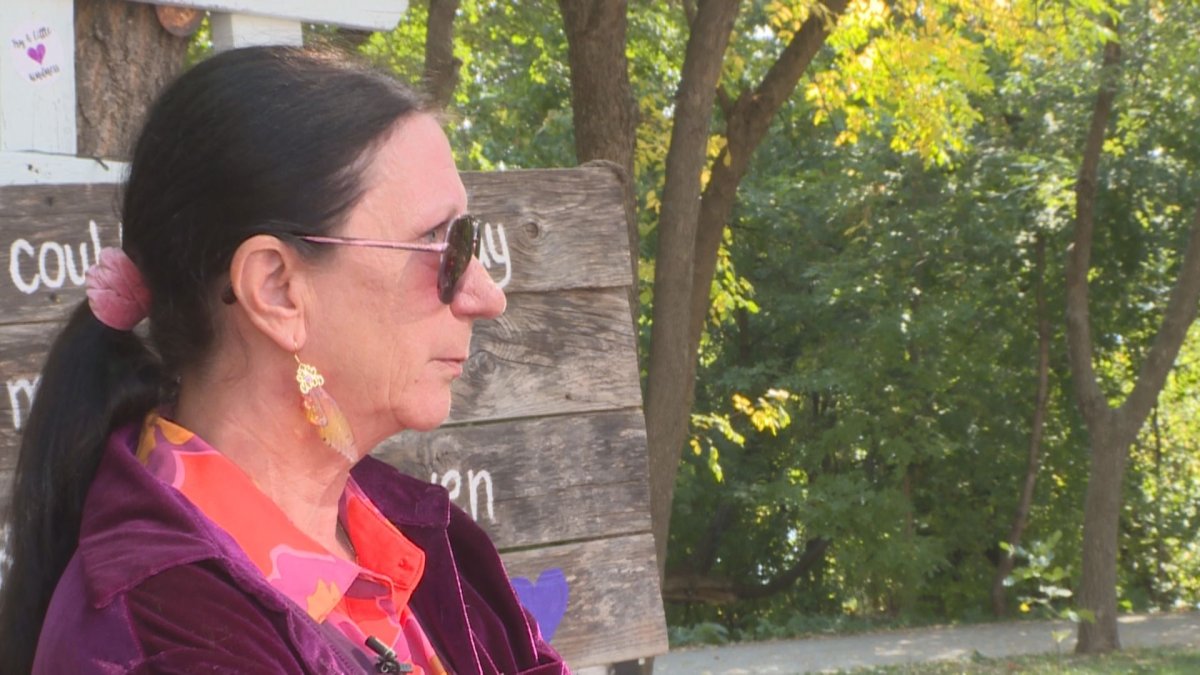Marian Goldstone remembers a time when everything felt hopeless.

“I didn’t realize how it was creeping up on me,” the Brandon, Man. resident said.
Goldstone was in her late 40s when she started experiencing symptoms of mental illness. For 11 years, Goldstone couldn’t work or participate in day-to-day life with her family.
“I was having trouble keeping myself organized,” she said. “I was beginning to isolate socially. I was having trouble keeping myself clean, even.”
Marian Goldstone works with the Mood Disorders Association of Manitoba, and helps people who live with mental health challenges like herself.
20 years ago, she reached out for help. Goldstone saw a psychiatrist, who ultimately prescribed her medication that helped her toward a healthier path.
“I can honestly say that if it were not for that connection with that psychiatrist on a very regular basis, I would not be standing before you today as a functional person… I may not even be standing before you at all. I didn’t wait very long, maybe a month, maybe six weeks,” she said. “Now, there simply isn’t a place for many people to go.”
Goldstone now works for the Mood Disorders Association of Manitoba (MDAM) and hears firsthand how Manitobans, especially in rural areas, have trouble getting the help they need.
Manitobans in need of professional mental-health care can face lengthy waits. Depending on the severity of symptoms and the health region, some patients can wait up to two years to see a psychologist or psychiatrist through the public system.
It’s due, in part, to a lack of staff. In a statement to Global News, Shared Health said it has recently hired 17 new psychologists, and six new psychiatrists. But as of September 2023, 22 per cent of its psychologist positions are still vacant, as are 21 per cent of its psychiatrist positions.
“The waitlists were lengthy pre-pandemic, and they’ve just gotten worse,” said Dr. Karen Dyck, executive director of the Manitoba Psychological Society (MPS).
The MPS surveyed its members in 2021 and found 16 per cent were no longer accepting new patients. Over half said their waitlist was one to six months long, and six per cent said over a year.

Dr. Dyck says in order to fill positions, Manitoba needs to offer competitive wages and offer more training opportunities.
“Looking at things like salaries and workloads are just going to be such an important piece in recruiting and retaining psychologists in the public system,” she said.
She adds waiting to treat a mental illness can cause a lifetime of complications.
“We certainly want to intervene quickly in a way that prevents the illness from exacerbating or continuing to impact them through the life span,” she said. “We know mental illness costs Manitoba millions of dollars in terms of medical costs.”
While waiting for treatment, some patients look for other sources of help. MDAM executive director Rita Chahal says nonprofits are trying to fill in, but are struggling to meet the overwhelming need.
Chahal says MDAM’s provincial funding has not increased since 2007. Recently, they’ve had to cut staff hours and turn some people away.
“It breaks our hearts, it really does,” she said. “It breaks the heart of my staff who say, you know, I wish I could help this person. The number of calls that we get for peer support on a daily basis, the people that come to our door and say, ‘Thank God I found a place, I didn’t know where to turn.’ Those are those are stories that we hear every single day.”
Chahal is happy the pandemic highlighted the importance of mental health, and decreased some of the stigma surrounding mental illness. But it also shone a light on how great the need is, and the ways in which Manitoba isn’t keeping up.
“When the health and wellness of an individual isn’t great, it affects the family. It affects the coworkers. It affects the community. And ultimately, you know, a country,” Chahal said.
Wait times are also lengthy for publicly funded addictions treatment. Shared Health says urgent cases are prioritized, but that the typical wait is one to three months, and can be up to six.
Manitoba is also the only province west of the Maritimes without a provincially funded safe consumption site. Sunshine House, a Winnipeg drop-in and resource centre, operates the Mobile Overdose Prevention Site (MOPS), but their federal funding is set to run out in October 2023.
Arlene Last-Kolb of Winnipeg lost her son Jessie to fentanyl poisoning in 2014. As an advocate with Moms Stop the Harm, she has pushed for years for government to recognize overdose deaths as a crisis, and to take an approach that includes harm reduction.
“What happens to people while they’re waiting on a treatment list?” she said. “What are they doing? Are they all just saying no? What happens when you go to treatment and you come out and you relapse? Why is the only option to call somebody for abstinence? What happens if you want to do a drug? Why are they not safe?”
Last-Kolb says forcing people into treatment is costing them their lives, and that while addiction may be more visible downtown, overdose deaths are happening in every part of the city and province.
“This can happen to anybody,” she said, “and you will never recover.”
She wants to see overdose and drug education commonly available in workplaces and schools, and for drug testing to be readily available, so that drug users don’t risk dying with every dose.
“I know far too many families that have spent their pension, their retirement, they have remortgaged their house and they’re still paying off debt for treatment for a child that is dead,” she said. “There are far too many other mothers out there like myself. This has got to stop.”
With mental illness and addiction often so closely linked, advocates say it’s time for an all-hands-on-deck approach. And while that may mean more funding, Dr. Dyck says it’s the only way to get adequate services to those who need them.
“I can appreciate that, you know, the general public and maybe the government is getting a little tired of everyone needing more money for things,” she said. “But the reality is, there’s information that really suggests that investing in psychology services in the long run saves money.”
Chahal says organizations need to work together to meet the needs of the community at large, and that experts and those with lived experiences should be the ones deciding how to deliver care. She’s hoping the government elected come Oct. 3 agrees.
“I think that we’re at a point that we really need to put our heads together and put a collaborative hat on rather than trying to do things in isolation,” she said. “I want them to ask their constituents what do they need rather than top down and say, ‘This is what we think you need as a community. ‘Ask the individuals.”









Comments